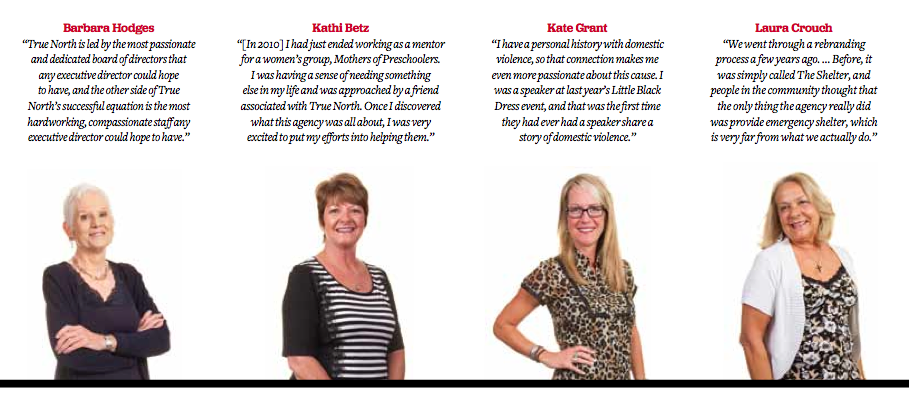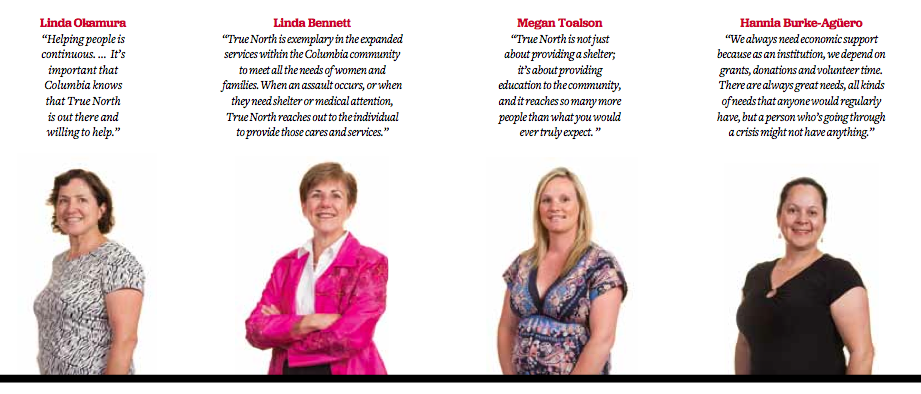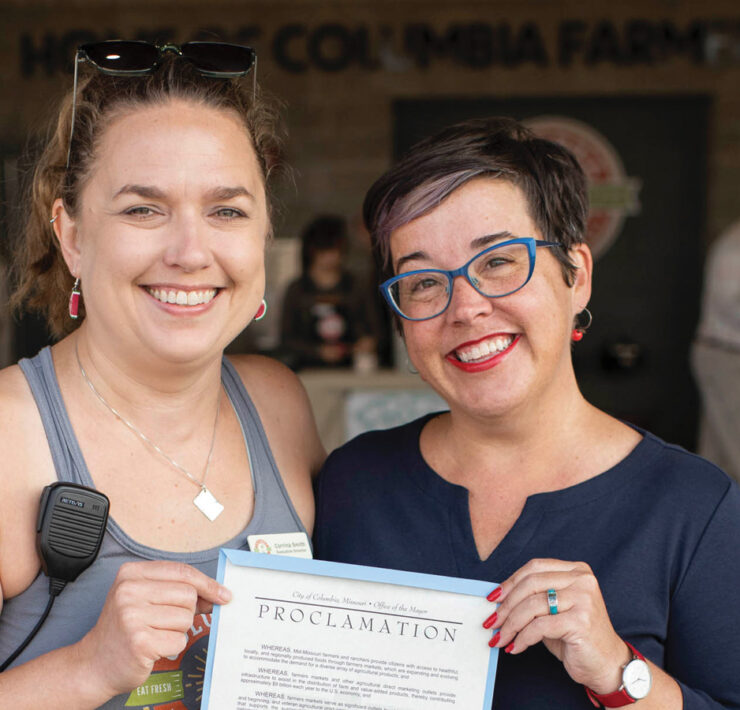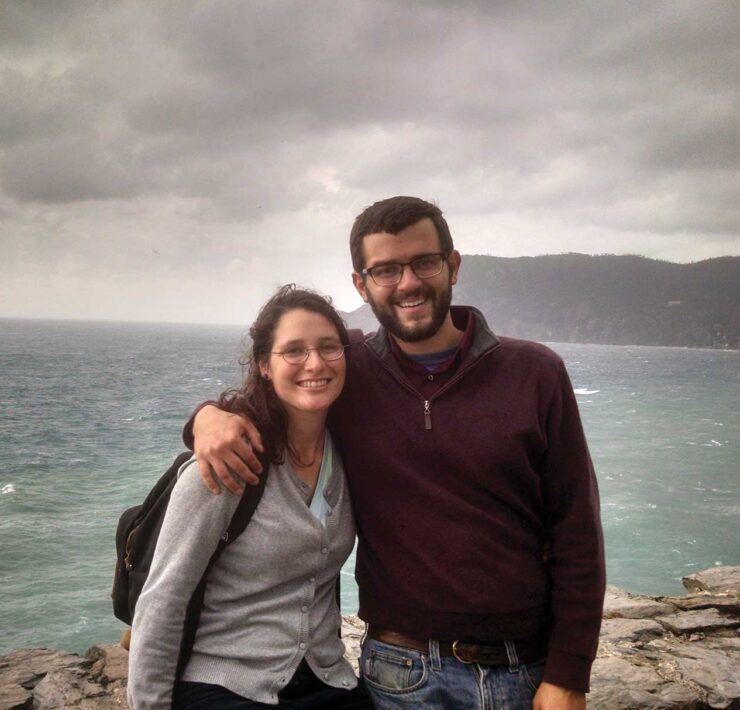True North’s new direction
When True North opened in the 1970s, the service program for victims of domestic abuse and sexual assault was simply a drop-in center. Then known as “The Shelter,” True North was started as a volunteer organization by a group of graduate students. True to its name, it offered help to women suffering abuse out of a small building by Columbia College.
Today, the organization helps between 600 and 700 people each year and has extended its reach to connect women to valuable community resources for job referrals, legal advocacy, basic counseling needs, a place to stay or general emotional support.
“I think there’s a heightened awareness about domestic violence, not just in Columbia but throughout the whole country,” says Executive Director Barbara Hodges. “There’s just more talking about that particular dynamic.”
Finding shelter
In the mid-1980s, True North moved from its location near Columbia College when Eliot and Muriel Battle took a personal interest in furthering the organization from its humble beginnings. The couple donated land for the 7,500-square-foot facility that has now housed the organization for 25 years.
The current shelter has a bed capacity of 25, though the duration of victims’ stays varies from one day to a few months. Some may return multiple times.
“The clients that come to us most often are in imminent danger,” Hodges says. “It can be physical abuse, mental abuse, psychological abuse, financial abuse. So we provide that safety for them.”
However, the organization reaches far more than the 200 or 300 victims who utilize its shelter services each year. In 2012, clients were 84.72 percent women, 15 percent children and 0.28 percent men. A toll-free 24-hour hotline, individual counseling, support groups and a team of long-term volunteers are all on hand to provide resources for each individual’s situation.
Hotline help
The toll-free 24-hour hotline has licensed staff equipped to handle emergency situations, including safety planning, referral information or simply emotional support. In 2012, the hotline received 1,218 calls. More often, the hotline staff directs callers to the residential shelter, where the agency’s 20 employees are on hand to help.
True North has two full-time case managers responsible for getting to know each individual woman. Their job is to help victims assess their needs, whether it be medical attention, employment, child care or specific counseling, and inform the victims of their options.
Clients can choose to have meetings with a licensed counselor that the agency employs or join one of True North’s support groups. There are resident and non-resident support groups, though both groups have confidential meeting locations and discuss long-term domestic violence, among other topics, according to Hodges.
“Occasionally we can also have a sexual assault victim or survivor support group, but that is not near as often,” Hodges says. “It’s so varied that it doesn’t have a commonality like domestic violence victims generally experience.”
Reaching out
True North has established a number of community partners to assist with its mission.
“The police will sometimes bring [people seeking help] to us,” Hodges says. “[Clients] might also know from word of mouth or from a friend or looking at the website.”
True North employees are also DOVE (Domestic Violence Enforcement Unit) advocates with the Columbia Police Department and Boone County Sheriff’s Department. While law enforcement directly responds to domestic abuse incidents, the advocates collaborate with Family Counseling Center of Missouri, the prosecuting attorney’s office and the Division of Family Services to ensure that the victim’s needs are met appropriately under state law.
The University of Missouri equivalent, the University Sexual Assault Response Team, is an additional initiative that works with the MU Athletic Department, the Department of Student Life, the Relationship and Sexual Violence Prevention Center and the MU Police Department to help victims of abuse and often direct them to True North.
Additionally,in 2012 True North provided 27 adult education and awareness events, 126 violence prevention education sessions and 16 victim service provider trainings, some of which take place at high schools and universities, Hodges says.
Day to day
At any given time, True North has between 25 and 30 volunteers. Each volunteer must go through an application process and extensive 48-hour training.
“They get to pick what they do because volunteers definitely have to be comfortable with what they are doing,” Hodges says.
The volunteers can act as hospital advocates who meet with victims at Columbia hospitals, residential assistants who help with paperwork and answer the 24-hour hotline or child-care assistants responsible for participating in activities with children of victims.
They can also help with donation drives to the organization’s wish list, a listing of items such as toiletries, grocery store gift cards, children’s commodities or household appliances that the shelter needs.
Volunteers, along with True North’s staff and community partners, help to drive True North’s success.
According to an anonymous survey True North conducted in 2012, 97 percent of those who had utilized its services expressed understanding of how to plan for their safety, 95 percent knew more about their rights and options and 97 percent were more hopeful about their future.
“When you see a woman that has been in a very dangerous situation, and now she’s starting a new life that is safe and where she can heal from the abuse that she’s experienced, that’s what’s most rewarding,” Hodges says.







